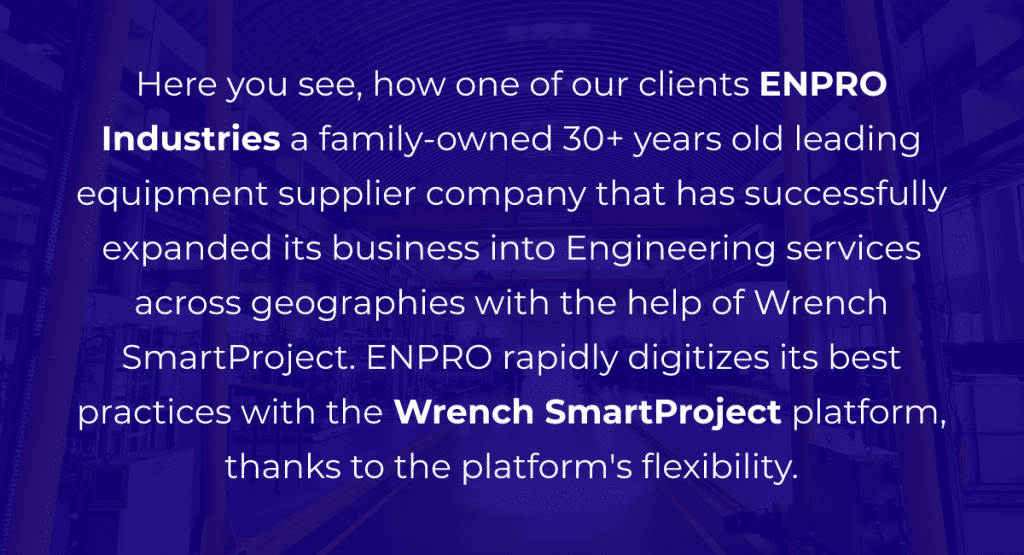- EPC Contractors
- 15 Mar 2022
EPC Equipment Supplier Guide: To chase or be chased by your clients

Challenges
If you’re a supplier of custom-designed equipment to EPC Contractors, chances are you’re constantly stressed about how to deliver to your clients on schedule despite multiple design revisions and late change requests. Plus, you’re constantly at risk for delay penalties. So under the circumstances, how do you expedite your process?
- Strict timelines
- Stringent Quality requirements
- Multiple revision of documents
- Late changes from clients
- Logistics issues
- Site Inspections
- Punch clearance, commissioning & performance testing
- As-Built and Handover
In my experience of working with EPC contractors and owner organizations over the years, I’ve seen firsthand the challenges equipment suppliers face in delivering equipment as per the project requirement and the struggle to close out the equipment supply contracts by both supplier and EPC organizations.
The challenge for the supplier begins from the pre-award phase when the offer is submitted without complete clarity on the client’s requirements, without the availability of technical information and site conditions, and all too often at ‘cut-throat’ prices. This happens because the intense competition leaves suppliers with no choice but to accept contracts and pricing.
Then, when the supplier produces design and detailed engineering based on the input received from the EPCs and Owners and is reviewed and commented on multiple times before approval for manufacturing, it’s easy to see how most of the activity of an equipment supplier is dependent on others. Also, the ordering of materials used for the fabrication of the equipment can be done only after approval of the specifications by the EPCs and Owner. Also, during the manufacturing stage also, the supplier has to comply with the multistage inspection requirements of the client before dispatching the equipment to the site for installation. The site installation and commissioning are dependent on factors that are not in the direct control of the supplier. So exactly how much control is left with the suppliers? Can a supplier take charge of his process?
I would say yes, but only with digital technology.

The Digital Solution for Real-World Business Problems
When documents are exchanged through e-mail or SharePoint sites, it becomes a herculean task to maintain the record of each of transaction, especially when multiple projects for different customers are being executed simultaneously. Also, since resources are shared between projects, it’s easy to lose track due to the amount of handling documentation. Thus, both internally and externally, progress reviews become marathon exercises, considering the amount of data to be collated to produce reports for submission and review.
Storing multiple revisions of documents and archiving the comments received from clients requires a large number of manhours. I have seen the struggle to close out contracts just because the equipment supplier failed to deliver the final documentation in the prescribed formats. This delay has a huge financial implication on the EPC Contractors and the supplier because 5-10% of the contract value can be held up until the delivery of As-Built documents.
Do the manhours spent on these activities add value to the business process?
I have to say No.
Many equipment suppliers worldwide have started to adopt systems for the digitization of documents following in the footsteps of EPC contractors to leverage the advantages of such systems. Moreover, they are looking at flexible solutions to suit their business process rather than the rigid frameworks offered by older document management systems. So now experienced and skilled resources get utilized for more productive and value-adding activities rather than low-value but high-cost tasks like keeping track of documents, which get taken care of by proven technologies.
In this way, with the wise adaption of digital technology, Equipment suppliers can turn the tables and chase EPC contractors for responses rather than be chased by them, and so can enhance the upscaling opportunities for their business.
Sajith is a Graduate Engineer and certified Project Management Professional from PMI who carries 30 years of industry experience. He has deep domain expertise in EPC who worked with major EPC Contractors and owner organisations in the Oil & Gas sector, including Petrofac, KNPC, KIPIC, Chevron, Almeer, BPL Ltd etc.. Sajith has executed EPC projects valuing around 500 M USD, and has been associated with a 16 billion USD new refinery project in Kuwait.
Related Posts

What is an EDMS?
EDMS has become popular in the EPC world in the last decade, especially after the pandemic. What is EDMS? At its core, EDMS is an electronic document management system or a software that organises and…
- 20 Mar 2025

Importance of Collaboration and Communication in Project Management in EPC Projects
As the EPC industry moves steadily towards digitisation and we’re seeing the emergence of an ever-increasing array of digital project management systems and Project Management Information systems (PMIS) in project management, it’s interesting to look…
- 21 Nov 2024
Archives
- April 2025
- March 2025
- February 2025
- January 2025
- November 2024
- October 2024
- September 2024
- August 2024
- July 2024
- June 2024
- May 2024
- April 2024
- March 2024
- January 2024
- December 2023
- November 2023
- September 2023
- August 2023
- July 2023
- June 2023
- May 2023
- April 2023
- March 2023
- February 2023
- January 2023
- December 2022
- November 2022
- September 2022
- June 2022
- May 2022
- April 2022
- March 2022
- January 2022
- November 2021
- October 2021
- July 2021
- June 2021
- May 2021
- March 2021
- February 2021
- January 2021
- December 2020
- November 2020
- September 2020
- August 2020
- June 2020
- April 2020
- March 2020
- February 2020
- January 2020
- November 2019
- October 2019
- September 2019
- August 2019
- April 2019
- March 2019
- December 2018
- October 2018
- September 2018
- August 2018
- July 2018
- June 2018
- May 2018
- April 2018
- January 2018
- November 2017
- October 2017
- September 2017
- May 2017
- April 2017
- March 2017
- February 2017
- January 2017
